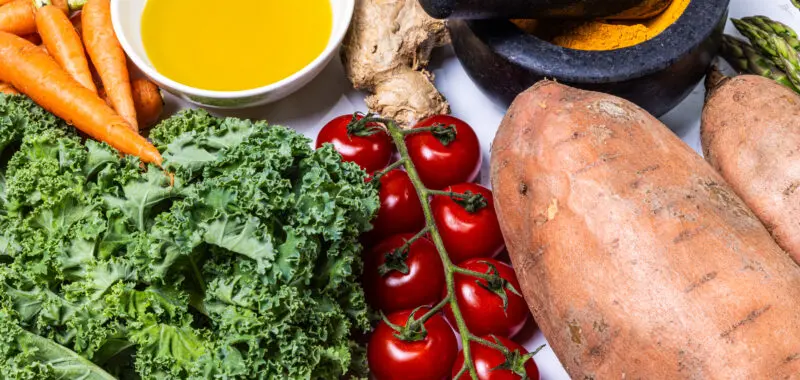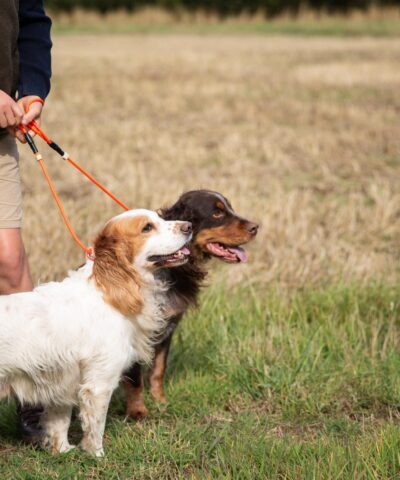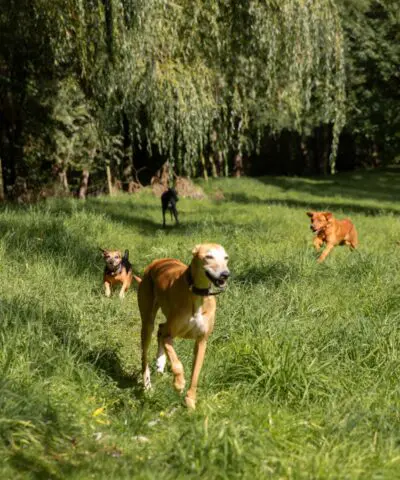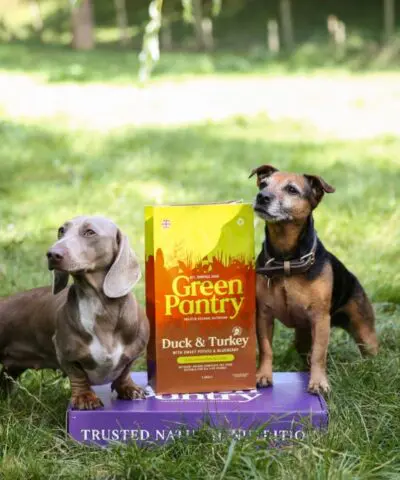As much as we don’t want them to, our dogs have to get older. And, as they age gracefully, their nutritional needs evolve just like ours. Seeing your companion get older isn’t the best feeling, but with correct nutrition and care, you can help them reach a happy and comfortable old age.
Luckily for you, here at Green Pantry, we’ve got completely natural senior dog food that will let your beloved senior enjoy their later life to the fullest, one nutritious meal at a time. And, in this blog, we’ll delve into specific dietary requirements for senior dogs, as well as practical tips to help you make the best decisions for their golden years.
Let’s get into it…
What age is a senior dog?
A dog’s age at which it is considered to be a senior depends on its size and breed. Usually, small dogs are classed as seniors when they reach the age of 11, medium dogs are aged 10, and larger dogs and giant breeds are aged 8. This of course changes for each breed and can depend on a lot of lifestyle choices such as their diet, weight, and how much exercise they get.
What changes happen as a dog gets older?
As dogs age, they experience a variety of physical and cognitive changes. These changes can be gradual, and the rate at which they occur varies from dog to dog. Be mindful of the changes you may need to accommodate your dog’s shifting abilities – some of the most common changes that you might observe in your senior dog include:
- Mobility – Mobility is often one of the most noticeable changes. Senior dogs may experience stiffness in their joints, leading to decreased activity levels, difficulty getting up and down, and reluctance to jump or climb stairs.
- Weight – Older dogs may gain weight due to decreased activity and a slower metabolism. In contrast to this, some dogs may actually lose weight due to decreased appetite or underlying health issues.
- Digestion – Some older dogs may experience changes in their digestive system, leading to constipation or irritable bowel syndrome.
- Dental health – Dental problems are also common in older dogs, including gum disease, tooth decay, and tartar buildup. These can cause pain and affect their ability to eat.
- Senses – Just like humans, hearing and vision can decline with age. You might start to notice that your dog doesn’t respond as readily to commands or bumps into things more often.
Recognising these changes will mean that you can adapt your environment and ensure that your dog can remain comfortable and happy as they reach the later stages of their lives.
What is the healthiest dog food for senior dogs?
So, wondering ‘What is the healthiest dog food for senior dogs?’ Well, the healthiest dog food for senior dogs will depend on your dog’s individual needs and preferences. Some dogs who are older in age might require a special diet to cater to their types of health issues.
Rebecca Wilkinson RVN MIRVAP (ICH), a Veterinary Nurse and Owner of Operation K9, a specialist Canine Hydrotherapy and Rehabilitation Centre, points out that:
‘’With the lifespan of dogs increasing, we are finding that nutrition is playing a more crucial role in the health and well-being of dogs in their older years.
As a dog’s metabolism, joint health and muscle mass decrease, nutrition is a way owners can help slow down these natural declines with the optimum diet for their pet’s life stage. Green Pantry has a range of high-quality, natural food with recognisable ingredients. Natural diets like this are a superior alternative to many heavily wheat and grain-based prescription diets”
Here are some of the specific ingredients to look for in a healthy senior dog food:
- High-quality protein sources – Protein is essential for maintaining muscle mass, which can decline as dogs age.
- Fibres – Fibre aids digestion and can help to prevent constipation.
- Vitamins and minerals – A balance and blend of vitamins and minerals is important for overall health.
- Omega fatty acids – These fatty acids, such as Omega 3, can support cognitive function and skin and coat health.
What is the best dry dog food for senior dogs?
Looking for a natural dog food that includes the ingredients mentioned above, is made in the UK, and tastes irresistibly delicious? Then look no further than Green Pantry! We’re committed to natural nutrition, using it to provide your dog with the highest-quality meals and nourishment, no matter how old they are.
(In our opinion), our range of natural senior dog food is one of the healthiest meals that you could serve your dog. Specifically, our Lamb with Cranberry & Turmeric dog food targets joint health and mobility which is common in older or less mobile dogs. Lamb is rich in omega-3 fatty acids, cranberry provides healthy antioxidants, and linseed can help to support joint health.
If your pooch is looking slightly on the larger side, we recommend our White Fish with Kale and Beetroot dry dog food. Low in fat and easily digestible, this food helps with weight loss and weight control. White-fish is naturally low in fat and easily digestible, while kale and beetroot help to provide an immune system boost through their natural vitamin profile.
Don’t forget about our natural dog treats that are bursting with vitamins and flavour… because senior dogs deserve to be treated, too!
Things you can do to help your ageing pooch
While diet plays a key role in your senior dog’s health and well-being, it’s just one piece of the puzzle. You shouldn’t wait until your dog starts showing signs of ageing to make changes to their daily routines – proactive care can significantly improve their quality of life in their senior years! Here are some additional tips that can help your ageing pooch thrive:
1. Keep them comfortable
If your dog has arthritis or other joint issues, then providing them with a comfortable and supportive bed is essential. Ensure that they have easy access to their food and water bowls, and if they do have mobility issues, then you might need to adjust their location. Your dog will give you clues about what they need to be comfortable, so paying close attention to any changes in behaviour is also crucial. Temperature control is also important – provide your senior pooch with a warm and cosy space in winter and a cool, shaded area in the summer.
Remember – Comfort isn’t just about physical ease, it’s also about emotional well-being. For senior dogs, a sense of security and familiarity can be just as important as a soft bed.
2. Consider supplements
Supplements can play a valuable role in supporting the health and well-being of older dogs. At Green Pantry, our natural dog supplements are unique and honest solutions that target specific health issues (dental health, bad joints, anxiety, and digestion) and make for a happier and healthier pooch. Whether your older dog is suffering from bad breath or creaky joints, a small sprinkle of supplement will help to give them that sparkle back in their eyes.
Remember – Seeing noticeable results from supplements may take a while. Calming supplements may show effects relatively quickly, while joint support supplements may require weeks or even months of consistent use to see improvements.
3. Adjust their exercise routine
While your senior dog might not be as active as they once were, regular exercise is still extremely important. It helps to maintain muscle mass, joint flexibility, and mental sharpness. Instead of dragging them out for long, difficult walks, opt for shorter, more frequent walks instead. Make sure to pay attention to your dog’s cues and where in their bodies they suffer from the pain the most – this will allow you to adapt their exercise routine accordingly. Regular and gentle exercise is more beneficial than occasional bursts of activity.
Remember – Each dog ages differently and will require a different level of exercise, especially as they age. Therefore, it’s essential to tailor their exercise routine to their individual needs and abilities.
4. Look after their teeth
Senior dogs, unfortunately, are more prone to dental diseases, so regular dental care is a must. Just like humans, dogs need regular dental checkups to catch any problems early, but you might want to have them more frequently as your dog starts to age. First things first, be aware and alert of any changes to your dog’s teeth, including bad breath, difficulty chewing, and drooling or pawing at the mouth. Regular brushing is recommended, and you can get dog-friendly toothbrushes and toothpaste to help with this.
Remember – Dental health is important for your dog’s overall well-being. A healthy diet plays a big part in the quality of your dog’s teeth, with some foods being made to target dental problems specifically.
Read our expert interview: The Importance of Dental Dog Care for more information.
5. Love and affection
Perhaps the most important thing you can do for your senior pooch is to provide them with plenty of love and affection! This can include spending quality time with them, cuddling them, and talking to them. Our dogs are our furry best pals, and, as they age, it’s important to make the most of every minute with them. Your presence and attention will mean the world to them in their later years.
Remember – Senior dogs often find comfort in routine. Try to maintain consistent feeding, walking, and bedtime schedules that will keep them happy and comfortable.
Aid your senior dog with a diet from Green Pantry
Hopefully, this blog has answered your question: ‘What is the healthiest dog food for senior dogs?’ While a healthy and nutritious diet is of course a considerable factor, we hope that you’ve considered the other tips and tricks in this guide. Just like humans, every older dog should be able to enjoy their later years in comfort and with the optimum love and care.
If you have any questions or would like more information, please don’t hesitate to get in touch. Or, give us a call on 01553 811 320 – a member of our team will be more than happy to get back to you. It’s our excellent customer service that makes us so unique – see for yourself by reading our 4.9/5 Trustpilot reviews!
“Green Pantry’s dog food is the best food I have ever used for my old rescue boy. It’s helped him in every way and made such a difference to the overall health of my friend’s dog too.” – Helen Macleod, 5 stars.
Healthy senior dog food FAQs
Should I feed my senior dog wet or dry food?
Whether to feed a dog wet or dry dog food is a common question and one which doesn’t always have a straightforward answer. Both types of food have pros and cons, especially for older dogs. However, we recommend our dry dog food, also known as kibble, as it is more economical and can also be beneficial for dogs with poor dental health.
What is the most unhealthy food for senior dogs?
Having a healthy diet is essential, no matter your dog’s age. Some of the most unhealthy things that you could feed a senior dog include chocolate, grapes and raisins, and onions and garlic. You should also avoid feeding your dog human foods, salts, and sugars. It’s important to feed your dog healthy and natural ingredients. You can check out what’s in our pantry to see what our recipes are made up of!
What is the best food to give a senior dog?
Senior dogs need lots of nutrients and goodness, especially if they suffer from health issues. The best food that you can give them is from Green Pantry, where each bag of food contains fresh meat and fish as well as an abundance of fruit and vegetables. Each bite is easily digestible and puts less strain on your dog’s body. Our commitment to superior quality and fresh food preparation is what sets us apart – we’re sure your senior pooch will love it!





